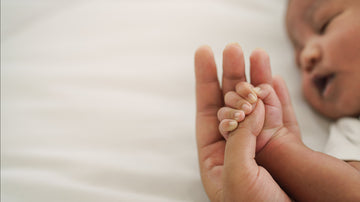Access Denied
IMPORTANT! If you’re a store owner, please make sure you have Customer accounts enabled in your Store Admin, as you have customer based locks set up with EasyLockdown app. Enable Customer Accounts
50 Pregnancy Ailments: What’s Normal and How to Help
Elizabeth MacDonald

Every pregnancy is different. While you do gain infinite wisdom after birthing a baby, the next pregnancy may just bowl you over with not one similarity to the other.
Whether you are an anxious, high-stressed mom-to-be who wants to know every possible ailment that may be heading her way; or you are a mellow, mom of four who thought she had experienced it all, this list may become a useful tool.
All of these ailments are common; however, it is NOT uncommon to experience zero ailments from this list and just breeze through pregnancy like you are some Pregnancy Goddess… (Which, duh – you are, no matter how you are feeling.)
50 Pregnancy Ailments
1. Having ZERO symptoms: You’re friends have all complained about every pregnancy issue on the planet, but you can’t contribute to the conversation. Don’t feel odd, you aren’t alone! Having an easy, breezy, symptom-free pregnancy is just fine. It does not mean anything is wrong.
2. Exhaustion: First and third-trimester exhaustion is well known, but don’t fret if the energy just doesn’t return even in that golden second trimester. Increasing your iron intake can help tremendously!
3. Not Feeling Fetal Movement: Placenta placement plays a huge role in feeling fetal movements. Typically, the placenta is posterior (behind) your baby and you will feel kicks around 16 weeks along. However, an anterior (in front of your baby) placenta will act as a barrier and keep you from feeling much of anything until as far as 20-24 weeks along. If your placenta is posterior and you are still not feeling much, you may have a relaxed little human on your hands. Don’t be afraid to ask for more frequent appointments until you feel movement. Hearing the heartbeat will reassure you that everything is ok, too. If you have been feeling movement and suddenly don’t, try the kick count test by drinking orange juice and lying down to concentrate solely on your baby. If you aren’t feeling much, call your birth team for a heart rate check.
4. Anxiety and Fears: This may just come with the pregnancy territory and of course depends on each woman’s individual personality. Pregnancy is full of unknowns, parenthood is full of unknowns. Anxiety is normal. If you feel as though it is hindering your life or taking over your thoughts, speak to your birth team as soon as possible. This could lead to prenatal depression.
5. Foot Growth: This is one of those crap-shoots that randomly target some pregnant women for no known rhyme or reason – stupid hormones. And there’s nothing you can do about it.
6. “Morning” Sickness (All Day, Evening, or Night Nausea): All forms of nausea are normal throughout pregnancy. While most women see it lessen in the second trimester, others experience this up until the baby is born. Make sure that you are well hydrated and eating small meals often. Taking B-6, zinc, and increasing B-complex vitamins and iron intake tend to help with queasiness. Raw ginger, ginger gum, and even peppermint have also been known to help.
7. Vomiting: A step further than morning sickness, vomiting can be debilitating to some women. Depending on the severity, your birth team may decide that medication is needed. Although, that can be the last resort. Avoid triggers such as certain smells or textured foods, and keep food in the stomach. Other ideas: here
8. Overheated: With blood flow increasing throughout pregnancy, you are going to feel a shift in your natural thermostat. Most women become very warm and struggle with cooling down. Stay comfortable with cool showers and luke-warm baths frequently; sleep with a fan, and stay hydrated.
9. Freezing: This internal thermostat may shift the opposite way and turn you into an ice chest. Layering your clothes, keeping a sweater nearby, and wearing warm socks may help. Don’t deny yourself warm baths too!
10. Headaches: Most common during the first and third trimester, headaches are caused by the surge of hormones and increased blood flow. Dehydration, sleep deprivation, low iron, low blood sugar, poor posture, and stress may also trigger a headache. Chiropractic care, acupuncture, exercise, and a healthy, balanced diet can improve frequency. Utilizing essential oils, warm compresses, pressure points, and massage may also help.
11. Insomnia: You can take a lavender bath, place a drop of lavender oil on your pillow, plug in a sleep machine, and exercise regularly to help the body prepare for sleep.
12. Shortness of Breath: An increase in pregnancy hormones (progesterone) stimulates your brain to tell your lungs that they need to take in more air. This can make you feel like you need to take more and deeper breaths, but the growing uterus adds pressure to the diaphragm, making it feel like a challenge to get those deeper breaths. Correcting your posture can make getting air easier, and a chiropractor may help if you struggle with chronic poor posture.
13. Yeast Infections: High amounts of estrogen secreted during pregnancy can cause the vagina to produce glycogen. This makes it convenient for yeast to infest and grow. Estrogen also propels the speed of the growth, enabling the yeast to stick to the vaginal walls. Cut out sugar and refined carbohydrates from your diet, as they feed yeast growth.
14. PUPP Rash: A burning and itching, unlike anything you can imagine. This rash is no joke! The most natural way to soothe is by rubbing a banana peel over the rash.
15. Knee Pain: You may experience pain in your knees from standing or walking for long periods. Your feet become heavier in pregnancy and exert a lot more pressure on your muscles and joints. Make sure to prop your feet up to take the weight off, and wear a knee brace if it helps. Also, try to limit excess weight gain. If the pain persists, try a topical arnica rub (a homeopathic) and alternate between hot and cold compresses.
16. Change in Eye Sight: This is not as common as other ailments, but it is classified as normal. Work with your eye doctor closely, as you may need a new prescription, but it may return to normal once the baby arrives.
17. Hair Loss: You may have heard that your hair starts falling out after the baby is born, but for some women, it happens while pregnant! This can be a bit frightening, but it is not that uncommon. You may want to have your thyroid checked and have a blood work panel done on your vitamin and mineral levels. There may be something more than pregnancy triggering hair loss. More thoughts on hair loss: here
18. Body Hair: You may become harrier while pregnant- hair on your breasts, abdomen, and face may show up out of nowhere. (Thank you hormones) But on the flip side, you may notice that your arm and leg hair growth radically slows down. The hormones are responsible and again, you may want to have a blood panel done to know if you are deficient in any vitamins or minerals.
19. Hair Growth: Long, luscious locks that you have never had before? YES PLEASE. A very common side effect of pregnancy is a thickening and faster-growing mane! Don’t be too excited, all those new strands will probably fall out after the baby arrives.
20. Acne: Thank you hormones. You not only mess with every unseen part of a woman’s pregnant self, but you can cause some serious acne. This is unfair and ugly and just cruel, but it is true. Wash your face daily with a natural product and keep the skin properly moisturized.
21. Gas: This is one of the more embarrassing side effects of pregnancy. The prominence of progesterone in a pregnant woman’s body plays a role in excessive gas. Progesterone slows the digestive process, causing the horrible bloated feeling and gas. Keep a food journal to figure out the foods that may be triggering the gas and eat smaller more frequent meals.
22. Heartburn: Wives’ Tales link heartburn to a head full of hair, but whether that is true or not doesn’t matter. What matters is a relief!! While most women swear by Tums, remember that they are filled with synthetic sugars, dyes, and fillers – so order yourself some papaya enzymes instead! Other Ideas: here
23. Cramps/Abdominal Pain: Unless the cramping intensifies or bleeding occurs, cramping typically means the uterus is growing. This is the number one complaint and scare throughout pregnancy. If you are scared, please go visit your birth team. They will be there to reassure you.
24. Vivid Dreams: Ranging from orgasmic to terrifying, all of these hormones mess with your dreams. Don’t feel guilty or upset by these, as they have no significant meaning – THANK GOODNESS, but if they have you extremely worried, you can talk to a friend, therapist, or trusted family member about what you are seeing.
25. Increased Sex Drive: Thank you blood flow! As long as you have a willing partner, pregnancy can be a VERY orgasmic time period for you! Work with your belly and comfort zones and go wild! Sex actually is a wonderful form of exercise AND provides wonderful benefits emotionally for you. Semen has natural “antibiotics” that line the cervix to prevent infection – it also helps soften the cervix to help prepare for labor.
26. Zero Sex Drive: And then there are those who have absolutely no interest in having sex while pregnant. It is common to begin pregnancy in this stage and by half-way through, join team “Sex-is-Awesome!”
27. Back Pain: Discomfort is hard to prevent while pregnant but a chiropractor can save you. Because you are growing and gaining weight, your posture will naturally shift slightly (or a lot). This will cause pains throughout the body, but mainly in your back. Practicing yoga, sitting straight (not slouched on the couch), exercise, and not gaining excess weight will help with the pain. Other Ideas: here
28. Poor Bladder Control: You’ve heard about those kegel exercises you should be doing, but maybe you’ve slacked a bit. You have this hammock-like muscle that is stretched throughout pregnancy (kegel muscle), and it affects your bladder control. This may not matter much to you now, but after the baby arrives, peeing when you sneeze is not pleasant. How To Kegel: here
29. Increased Urination: That uterus is expanding and it places constant pressure on your bladder. So anytime there is ANY urine in the bladder, you feel as though you need to pee immediately! Just a pregnancy perk. It may be worse if the baby is sitting very low.
30. Sensitive Breasts: Your breasts will change and grow right along with your uterus. They are preparing to make colostrum and then milk for the baby. Warm or cold compresses may help, but the truth is that your breasts are meant to do this job.
31. Braxton Hicks: These vary from woman to woman and pregnancy to pregnancy. Consider them exercises for the uterus. They are very valuable and should not scare you. Braxton Hicks prepares the uterus for labor. Most women describe them as a tightening of the abdomen. They may make you catch your breath or slow down. If they happen frequently, try to lower your stress level, lay down, take a bath, and relax. If they continue at more than 6 an hour, contact your birth team.
32. Stretch Marks: You will be slammed with people selling you creams and products to prevent these from occurring, but the truth is that most stretch marks are linked to genetics. You can use a cocoa butter lotion or other products, and they may help, but if it’s in your DNA to leave marks as you grow, it may be out of your hands. Prevention Ideas: here
33. Swelling: This is dangerous territory. It is normal to complain about slight swelling, BUT if you swell suddenly or overnight, you need to have your blood pressure taken immediately as this is a warning sign to pre-eclampsia. Contact your birth team if your swelling is concerning you at all.
34. Weight Gain: It can cause pains and problems, discomfort, and extreme emotions. Your weight will change while pregnant. By exercising and eating a healthy, well-balanced diet of whole, real foods, you will minimize the complaints that come along with weight gain.
35. Increased Hunger: You are growing a human. This takes energy. Energy is fueled by what we put into your body. Make smart food choices. Increase your protein intake to stay fuller longer.
36. Decreased Hunger: As your uterus grows, there is less room to fill the stomach. You will need to eat smaller meals more frequently to keep satisfied, but it is common to lose interest in food due to nausea or food smells. If you fall into this category, really try to keep healthy protein-packed snacks on hand to eat sparingly throughout the day.
37. Hemorrhoids: These can develop internally or externally in the rectum or anus. They can burn, itch, and be all-around crappy (literally). Hemorrhoids are basically varicose veins of the rectum, and with increased blood flow during pregnancy, they can develop easily. You may have blood around your stool or when you wipe or an uncomfortable pressure in your rectum. Add more fiber into your diet to help ease the discomfort of going to the restroom. Witch hazel and warm sitz baths are known to help with hemorrhoids. Other Ideas: here
38. Pigmentation: Less common that most ailments, pigmentation of the skin can occur. Dark circles, discoloration, and extremely chapped lips can all show up one morning and last until after baby arrives. Aloe Vero pulp is rumored to help, as is lemon dipped in turmeric rubbed on the areas.
39. Prenatal Depression: Everyone has heard of post-partum depression, but becoming depressed while pregnant can also occur. It needs to be taken very seriously. Feelings of sadness may be common, but if you are feeling as though a cloud is hanging over you, please contact your birth team immediately for help. More Info: here
40. Constipation: The discomfort of constipation is no joke. Your prenatal vitamin can be to blame, or just the pregnancy. Try to increase your fiber intake and start taking magnesium. Exercise should also help the bowels function better. Other Ideas: here
41. Diarrhea: The body may not enjoy the same foods while pregnant. Keep a food journal to track bowel movements after you eat. You may find dairy or gluten may trigger this ailment. Finding the root cause will ease your mind of having restroom locations on your radar at all times.
42. Emotional Rollercoaster/Mood Swings: If the feelings of sadness are overwhelming contact your birth team to talk.
43. Pregnancy Brain: This turns into “Mommy Brain” once the baby arrives. Leaving your car keys in the freezer, or throwing the remote control in the garbage, you are not going crazy.
44. Spotting: Spotting throughout early pregnancy is VERY common, but very worrisome as well. There are several reasons this can occur and still lead to a very healthy pregnancy and delivery. Spotting after sex is also very common. However, if you are cramping and spotting, there is a higher cause to worry. Call your birth team to be seen.
45. Cold Symptoms: This is an odd one. Some women complain of cold symptoms throughout the entire pregnancy. There is an excess mucus that is present and can cause sinus pressure, sore throat, and everything else “cold-like.” You may talk to your birth team about medication, but it’s better to just ride it out.
46. Itchy Skin: While stretching, the skin may become itchy. This can be a sign of stretch marks or pregnancy rash, or it can just be a common annoyance. Keep the skin moisturized daily.
47. Metal Mouth: That metallic taste is not in your head. The taste buds can change during pregnancy – or your salivary glands are under-producing. More Ideas: here
48. Leg/Foot Cramps: Many women suffer from daily or nightly leg or foot cramps. These can bring tears to your eyes and keep you from sleeping. Stretching, exercise, staying hydrated, and using magnesium (supplements, or topically) will help eliminate these cramps. The best way to use the magnesium is through a foot soak – hello relaxation and goodbye cramping!
49. Varicose Veins: Enlarged, bluish bulging vessels that have been stretched and weakened. Blood accumulates here and results in cramping, aching and heaviness. Avoid standing or sitting for long periods and wear loose fitting garments. Other Ideas: here
50. Cravings: Cravings normally are a sign your body is in need of something – and it is typically not the food you are wanting, but a vitamin or mineral you are lacking.
Comments
Leave a comment
Your Email Address Will Not Be Published. Required Fields Are Marked *
Subscribe to our Newsletter
Subscribe to our newsletter and receive our articles & discounts.
Invalid password
Enter
Use left/right arrows to navigate the slideshow or swipe left/right if using a mobile device







